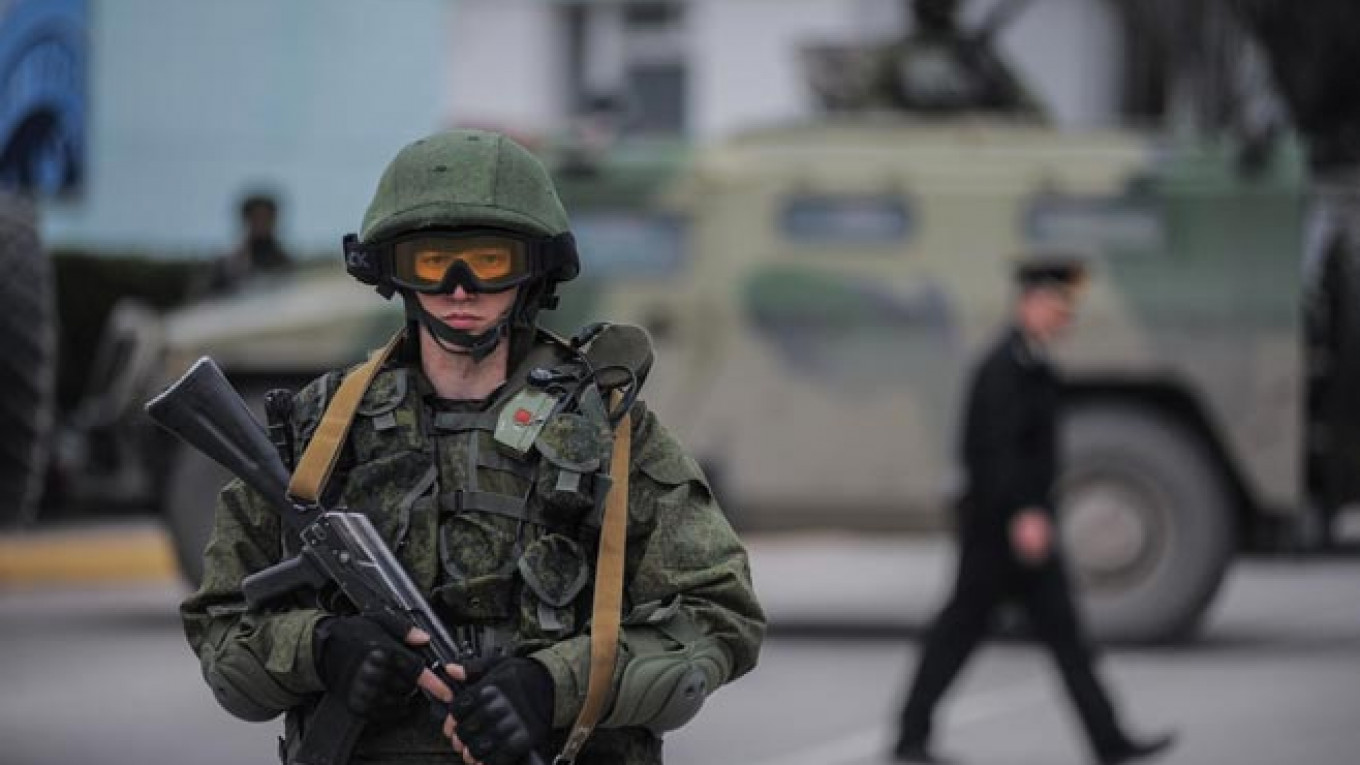On the same day that Russia annexed Crimea, the U.S. imposed laughable sanctions against Moscow. Swedish Foreign Minister Carl Bildt explained the move as a warning to Russia: "The first round of sanctions had to send a signal to Moscow that if it goes further, we will, too."
But President Vladimir Putin either took no notice of this warning or did not take the prospect of consequences seriously.
In last Tuesday's speech at the Kremlin before the treaty-signing ceremony incorporating Crimea into Russia, Putin practically declared that Russia has rights to southeastern Ukraine. He also used the words "divided nation" and "national traitors" — just as Adolf Hitler had done when he referred to national "Verräter" or traitors.
Russia continued its buildup of military forces on Ukraine's borders and thousands of pro-Putin demonstrators marched in Kharkiv and Donetsk, calling on Russia to "protect us from the Banderas" — a reference to the World War II Ukrainian nationalist Stepan Bandera.
At the same time, Russian officials clearly stated that the West could not achieve stabilization in Ukraine without Moscow's participation, and that stabilization could only be achieved by changing the Constitution and federalizing Ukraine.
In response to Putin, the West applied a second round of sanctions, this time affecting Putin's inner circle.
The West is well aware that the fate of all of Ukraine is at stake. Putin seems poised to send troops into southeast Ukraine "to protect the local population from Western-sponsored fascists."
Will war break out? A mere glance at the map shows that the annexation of Crimea is just the beginning of the division of Ukraine. Crimea has no local source of electricity, gas or even water. Controlling territory when it lacks a land corridor is like owning a suitcase without a handle. This particularly applies to the self-proclaimed Transdnestr republic, Russia's de facto client state. To create a land corridor to Transdnestr, Putin needs to control Odessa and the Mykolaiv and Kherson regions of Ukraine.
How will Russia fight this war? Unfortunately, it will likely be fought using women and children as shields. Putin said as much at a news conference on March 4: "And let's see those troops try to shoot their own people, with us behind them — not in the front, but behind. Let them just try to shoot at women and children!"
It was not an empty threat. The Ukrainian naval headquarters in Crimea were stormed in the same fashion: by an angry mob supported from behind by Russian troops.
Putin faces the task of creating a justification for this war. As things stand, the only pretext Putin has to send troops into Donetsk and Kharkiv is some flimsy appeals made by pro-Kremlin street protesters.
And much to his displeasure, a war over southeast Ukraine has the potential to backfire against him. It will benefit Kiev by rallying the people around the new government.
If the current Ukrainian authorities agree to Putin's terms, change the constitution and hand over southeast Ukraine, they will lose power. If they refuse to comply and call for the Ukrainian people to resist the aggressor, they become the national heroes. It seems clear that they will choose the latter.
This means that if Putin does not reverse course now, there is simply nothing left to prevent war. But he shows no sign of backing down. In an ominous sign, thousands of pro-Russian demonstrators in eastern Ukraine last Sunday shouted demands "to join forces from Odessa to Kharkiv to hold simultaneous local referendums to federalize Ukraine."
One can only hope Putin does not heed their call.
Yulia Latynina hosts a political talk show on Ekho Moskvy radio.
A Message from The Moscow Times:
Dear readers,
We are facing unprecedented challenges. Russia's Prosecutor General's Office has designated The Moscow Times as an "undesirable" organization, criminalizing our work and putting our staff at risk of prosecution. This follows our earlier unjust labeling as a "foreign agent."
These actions are direct attempts to silence independent journalism in Russia. The authorities claim our work "discredits the decisions of the Russian leadership." We see things differently: we strive to provide accurate, unbiased reporting on Russia.
We, the journalists of The Moscow Times, refuse to be silenced. But to continue our work, we need your help.
Your support, no matter how small, makes a world of difference. If you can, please support us monthly starting from just $2. It's quick to set up, and every contribution makes a significant impact.
By supporting The Moscow Times, you're defending open, independent journalism in the face of repression. Thank you for standing with us.
Remind me later.








